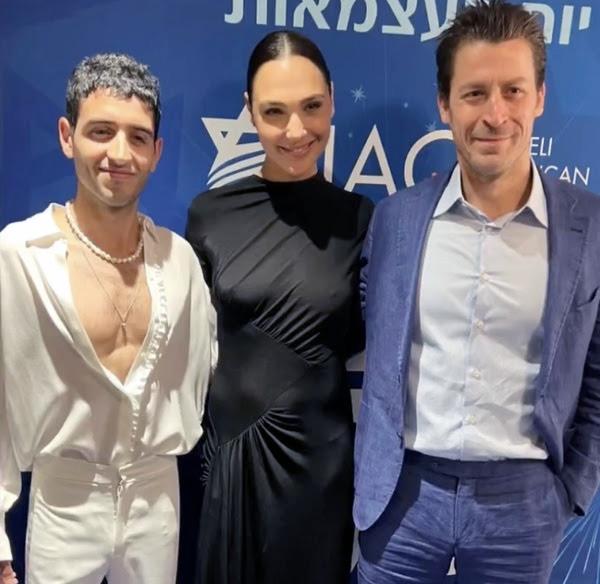
3 minute read
RABBI DR. SHMULY YANKLOWITZ
This Arizona rabbi chooses Judaism, again and again
By Shannon Levitt
AT 10 YEARS OLD, THE BOY WHO WOULD GROW up to be Rabbi Dr. Shmuly Yanklowitz – one of the 50 most influential American rabbis according to both the Forward and Newsweek -made a choice. He chose to be a Jew.
Yanklowitz was raised in an interfaith home, and his Christian mother and Jewish father left his religious destiny in his young hands. He chose Reform and an eventual bar mitzvah. He was very active in the Reform movement -- so active, in fact, he became head of the Reform minyan at his college, the University of Texas at Austin.
That’s not the end of the story, however.
At about 20 years old and still a student at UT, Yanklowitz found himself wanting something different, “something very fervent, very intense,” he said. Thus, he chose Orthodox Judaism and a second conversion.
Yanklowitz has three rabbinic ordinations, two master’s degrees, one from Harvard and another from Yeshiva University, as well as a doctorate from Columbia University. He also served as the University of California Los Angeles Hillel’s senior Jewish educator and director of Jewish life and has written 22 books on Jewish ethics.
“I had a number of experiences in the ultra-Orthodox world that gave me that fulfillment that I was looking for,” he said. He became “ultra-Orthodox, like in the ‘blackhat world,’ and then I moved to a hilltop caravan in the West Bank and was kind of like a religious settler for a while.”

While his religious practice would change and change again, Yanklowitz would keep choosing Judaism, because, he said, “saving lives and reducing suffering in the world is crucial to what Judaism is about,” in all its myriad forms. Eventually, he came to a more pluralist ideal of Judaism, a place where all Jews can learn from one another and work together for a more just world.
Yanklowitz draws strength from being in conversation with all Jews, no matter their affiliation, or lack thereof, he said. “I see the struggles and benefits, pros and cons to each kind of denomination, and I think we do best when we learn from Ben Zoma in Pirkei Avot, that the wise person is someone who can learn with everyone and from everyone.”
He said his own religious journey taught him “both the sweetness and the inclusivity of the Reform world and the fervency and the intensity of the ultra-Orthodox world.”
In 2013, he accepted a job offer in Phoenix, Arizona, a city neither he nor his wife, Shoshana, had any connection to. Taking charge of Valley Beit Midrash (VBM), a nonprofit for Jewish learning and progressive activism, allowed him to work with the entire Jewish community, one which was large but largely disengaged.
Here was a city with a lot of very sophisticated, professional Jews who simply found Judaism unappealing “because they still have a seventh-grade understanding of it,” Yanklowitz said. Under his leadership, VBM became a place “to add depth to the Jewish discourse and raise the intellectual bar of what American Jews are talking about.”
He brought with him all that he had learned from his early humanitarian work in the global South when he was volunteering and working in places like El
Salvador, Guatemala, Senegal, and Thailand with American Jewish World Service, an international development and human rights nonprofit organization.
“That experience really affected me a lot,” he said.
Social action, in the form of helping immigrants on the U.S.-Mexico border, resettling Afghan refugees, and pushing for climate change legislation, as well as advocating for a host of other social justice issues, is one of the three pillars VBM is built upon.
Learning is another. That’s unsurprising, given Yanklowitz’s own biography. He has three rabbinic ordinations, two master’s degrees, one from Harvard and another from Yeshiva University, as well as a doctorate from Columbia University. He also served as the University of California Los Angeles’ Hillel senior Jewish educator and director of Jewish life and has written 22 books on Jewish ethics. Leadership development, the third pillar, is harder to measure, he said, but “you never know the people you’re going to inspire and how they will use this learning in their life.”
Yanklowitz’s view is that if you teach people Jewish values they will act upon them, which means saving lives, a goal he takes very seriously.
In 2015, after months spent researching live kidney donation and discerning what a call to save lives really means, he became a kidney donor for a person he had never met. He and Shoshana, a nurse practitioner, discussed the idea, worried about bad possible outcomes, but ultimately, went forward with the donation, because, he said, he “couldn’t look away.”
Similarly, he founded YATOM: The Jewish Foster & Adoption Network, and he and Rabbi Shmuly Yankowitz, rallies in Phoenix.
I see the struggles and benefits, pros and cons to each kind of denomination, and I think we do best when we learn from Ben Zoma in Pirkei Avot, that the wise person is someone who can learn with everyone and from everyone.











